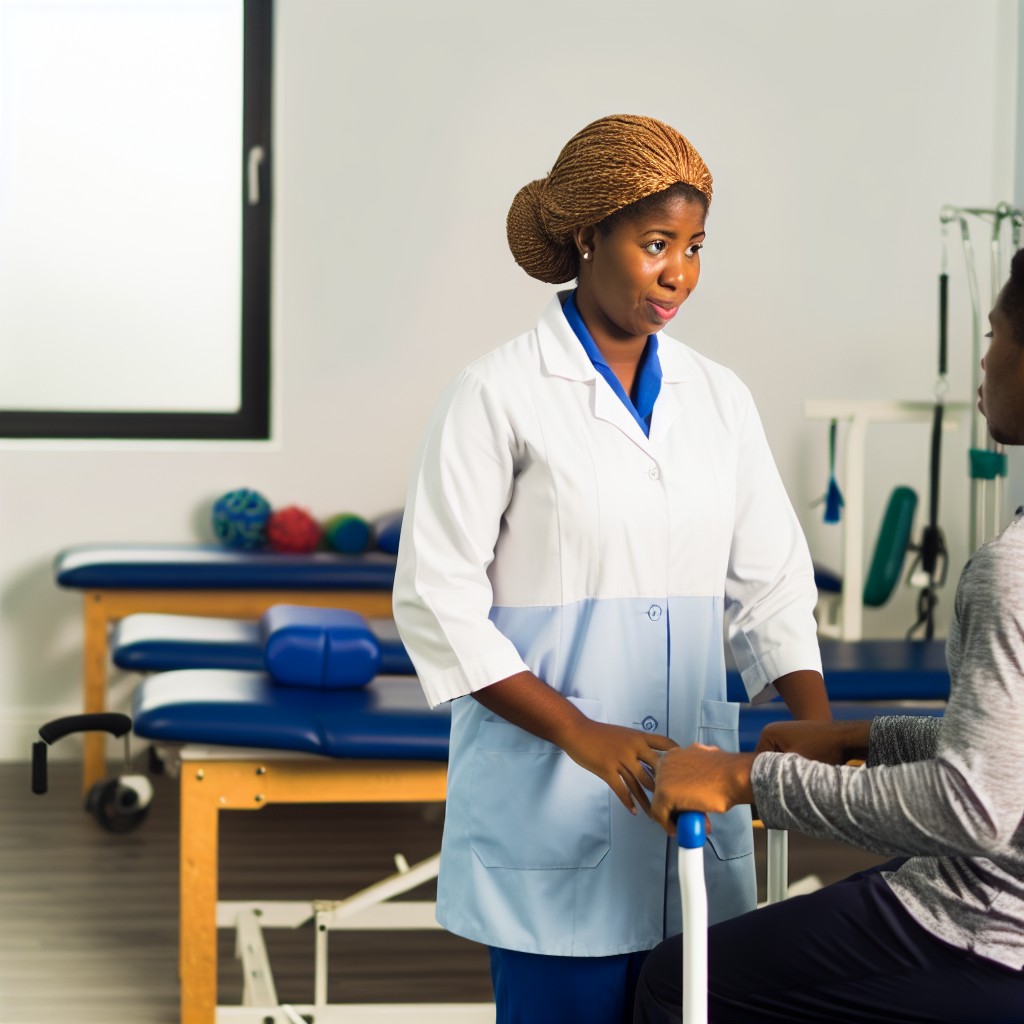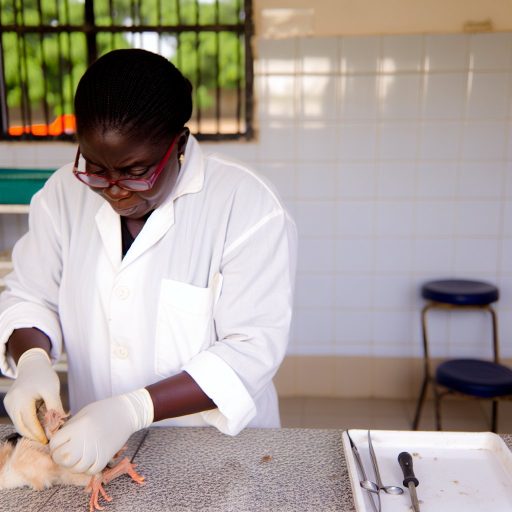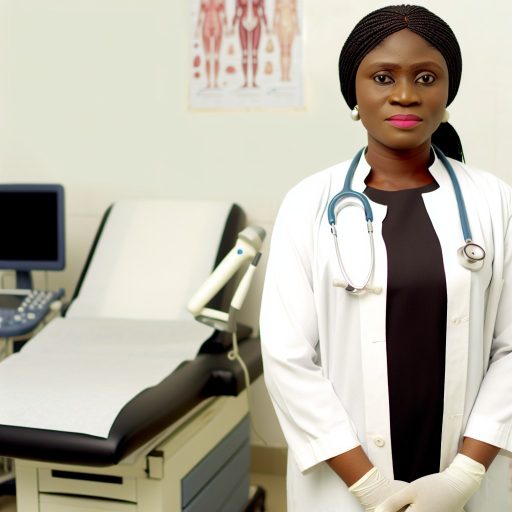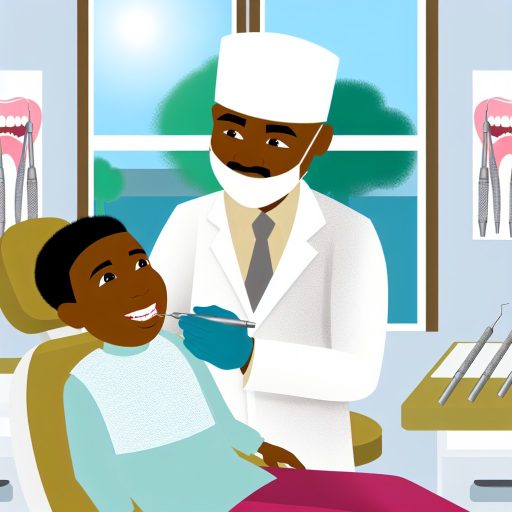Introduction
Rehabilitation hospitals and clinics in Nigeria play a crucial role in the healthcare system.
These facilities are dedicated to helping individuals recover from injuries, surgeries, or medical conditions.
Without rehabilitation services, patients may struggle to regain their strength, mobility, and independence.
These facilities provide specialized care and therapies to support the physical and emotional well-being of patients.
Whether someone is recovering from a stroke, orthopedic surgery, or a traumatic injury, rehabilitation hospitals and clinics offer comprehensive treatment plans tailored to each patient’s needs.
The goal is to help individuals achieve the highest level of functioning possible.
Rehabilitation facilities in Nigeria employ a multidisciplinary team of healthcare professionals, including doctors, nurses, therapists, and social workers.
This approach ensures that patients receive holistic care that addresses their medical, emotional, and social needs.
Furthermore, these hospitals and clinics utilize state-of-the-art equipment and innovative techniques to facilitate recovery and improve outcomes.
Patients have access to a range of therapies, such as physical therapy, occupational therapy, speech therapy, and psychological counseling.
Overall, rehabilitation hospitals and clinics in Nigeria offer a supportive and empowering environment for individuals on their journey to recovery.
By providing comprehensive care and specialized therapies, these facilities play a vital role in optimizing patients’ quality of life and overall well-being.
Rehabilitation Hospitals and Clinics in Nigeria
Rehabilitation hospitals and clinics play a crucial role in the healthcare system of Nigeria.
These facilities are equipped with specialized staff and advanced technology to help patients recover from various injuries and medical conditions.
Well-Known Facilities in Different Regions
- National Orthopaedic Hospital, Enugu: Known for orthopedic care and physical therapy.
- Federal Neuro-Psychiatric Hospital, Lagos: Specializes in psychiatric rehabilitation and mental health.
- Physio Centers of Africa, Abuja: Focuses on sports rehabilitation and musculoskeletal disorders.
- St. Kizito Clinic, Lagos: Offers comprehensive rehabilitation services for stroke and spinal cord injuries.
- Kupa Medical Centre, Kaduna: Provides holistic rehabilitation programs for various conditions.
Specialties and Areas of Expertise
Each rehabilitation hospital and clinic in Nigeria has its own unique strengths and areas of expertise.
For example, the National Orthopaedic Hospital in Enugu is renowned for its orthopedic care and physical therapy services.
Patients with bone fractures, joint replacements, and musculoskeletal injuries benefit from the hospital’s specialized treatment plans and rehabilitation programs.
On the other hand, the Federal Neuro-Psychiatric Hospital in Lagos focuses on psychiatric rehabilitation and mental health.
Patients with mental illnesses, behavioral disorders, and substance abuse problems receive personalized care from a multidisciplinary team of psychiatrists, psychologists, and social workers.
The hospital’s holistic approach to mental health treatment includes therapy sessions, medication management, and community reintegration programs.
Physio Centers of Africa in Abuja specializes in sports rehabilitation and musculoskeletal disorders.
Athletes recovering from sports injuries, individuals with chronic pain, and patients with mobility impairments benefit from the clinic’s state-of-the-art equipment and individualized treatment plans.
The clinic’s expert physiotherapists provide hands-on therapy, exercise prescriptions, and functional training to help patients regain their strength, flexibility, and range of motion.
St. Kizito Clinic in Lagos is known for its comprehensive rehabilitation services for stroke and spinal cord injuries.
Patients recovering from strokes, traumatic brain injuries, and spinal cord damage receive intensive rehabilitation therapy, nursing care, and psychological support at the clinic.
The clinic’s team of specialists focuses on improving patients’ motor skills, cognitive functions, and overall quality of life through customized treatment programs.
Kupa Medical Centre in Kaduna offers holistic rehabilitation programs for various conditions.
Patients with physical disabilities, neurological disorders, and chronic pain receive personalized care plans at the center.
The center’s multidisciplinary team of therapists, nurses, and support staff collaborates to provide comprehensive rehabilitation services that address the physical, emotional, and social needs of each patient.
Quality of Care and Patient Outcomes
The quality of care provided by rehabilitation hospitals and clinics in Nigeria is a critical aspect of their success.
Patients trust these facilities to deliver effective treatment, compassionate care, and positive outcomes.
By focusing on patient-centered care, evidence-based practices, and continuous improvement, rehabilitation hospitals and clinics in Nigeria strive to achieve high patient satisfaction rates and successful rehabilitation outcomes.
Healthcare providers and staff members at these facilities work together to create a supportive environment for patients.
Here, they feel empowered, respected, and motivated to participate in their rehabilitation journey.
By offering personalized treatment plans, ongoing monitoring, and follow-up care, rehabilitation hospitals and clinics in Nigeria ensure that patients receive the holistic care they need to recover fully and rebuild their lives.
Rehabilitation Services in Nigeria
Rehabilitation hospitals and clinics in Nigeria offer a wide range of services.
These services cater to the diverse needs of patients.
They are vital in helping individuals regain independence and improve their quality of life.
Physical Therapy
Physical therapy plays a crucial role in the rehabilitation process.
This therapy helps patients restore movement, flexibility, and strength.
Transform Your Career with Expert Guidance
Get personalized mentorship consulting that’s tailored to your unique path. Our expert advice is actionable and exclusive.
Get StartedIt involves personalized exercise programs targeting specific areas of the body.
These areas may have been affected by illness, injury, or surgery.
Occupational Therapy
Occupational therapy focuses on helping individuals perform daily tasks and activities.
Therapists work with patients to develop skills, routines, and strategies.
This enables them to participate in meaningful activities at home, work, or in the community.
Speech Therapy
Speech therapy is essential for individuals with communication and swallowing disorders.
Therapists use specialized techniques to help improve their speech, language, and swallowing abilities.
These improvements enable patients to communicate effectively and safely.
Psychological Counseling
Psychological counseling provides patients with emotional support during the rehabilitation process.
Counselors help individuals cope with psychological and emotional challenges that may arise.
This guidance empowers them to make positive changes and achieve their goals.
Vocational Training
Rehabilitation hospitals and clinics offer vocational training programs.
These programs help patients acquire skills and knowledge to return to work.
They also support pursuing new career paths.
These programs focus on developing job-related skills and enhancing employability.
Assistive Devices and Technologies
Rehabilitation facilities provide access to assistive devices and technologies.
These devices aid in mobility, communication, and daily living.
Examples include wheelchairs, prosthetics, and communication devices.
These tools enhance independence and quality of life.
Learn More: Dental Therapy vs. Dentistry: Key Differences
Success stories and patient testimonials:
– Real-life examples of individuals who have benefited from rehabilitation services.
– Positive outcomes and improvements in quality of life.
– Testimonials from patients, family members, and healthcare providers.
Rehabilitation Hospitals and Clinics in Nigeria Making a Difference
Rehabilitation hospitals and clinics in Nigeria play a crucial role in helping individuals recover from various health conditions and injuries.
These facilities provide personalized care and support to help patients regain their independence and improve their quality of life.
Here are some success stories and patient testimonials that showcase the positive impact of rehabilitation services:
Mrs. Aisha’s Journey to Recovery
After suffering a stroke, Mrs. Aisha was left with limited mobility and struggled to perform daily tasks.
She was referred to a rehabilitation hospital in Lagos, where she received dedicated physical therapy and occupational therapy.
Thanks to the comprehensive care she received, Mrs. Aisha regained her strength and independence.
She is now able to walk independently and engage in activities she once thought were impossible.
Mr. Tunde’s Remarkable Progress
Mr. Tunde, a construction worker, was involved in a workplace accident that left him with a spinal cord injury.
He was admitted to a rehabilitation clinic in Abuja, where he underwent intensive therapy and rehabilitation.
With the support of skilled therapists and healthcare providers, Mr. Tunde made significant progress in his recovery.
He can now perform daily tasks with minimal assistance and has regained his confidence to return to work.
Testimonials from Patients and Family Members
Many patients and their family members have shared their experiences and gratitude for the care they received at rehabilitation hospitals and clinics in Nigeria.
They have highlighted the compassionate and dedicated staff, the personalized treatment plans, and the positive outcomes they have achieved.
These testimonials serve as a testament to the effectiveness of rehabilitation services in improving the overall well-being of patients.
Healthcare Providers’ Perspective
Healthcare providers, including doctors, nurses, and therapists, have also praised the impact of rehabilitation services on patient outcomes.
They have witnessed firsthand the remarkable progress and improvements in quality of life that patients experience through rehabilitation.
These providers emphasize the importance of early intervention and comprehensive care in helping individuals recover and regain their independence.
Success stories and patient testimonials from rehabilitation hospitals and clinics in Nigeria highlight the positive impact of rehabilitation services on individuals’ lives.
These real-life examples demonstrate the effectiveness of personalized care, skilled therapy, and dedicated support in helping patients recover, regain their independence, and improve their quality of life.
Delve into the Subject: Best Hospitals for Maxillofacial Surgery in Nigeria
Limited Funding and Resources
One of the primary challenges faced by rehabilitation hospitals and clinics in Nigeria is the limited funding and resources available to them.
This lack of financial support can severely impact the quality of care that patients receive and the effectiveness of rehabilitation programs.
Shortage of Qualified Healthcare Professionals
Another major obstacle for rehabilitation facilities in Nigeria is the shortage of qualified healthcare professionals.
The demand for skilled therapists, nurses, and doctors far outweighs the supply, leading to overworked staff and subpar patient care.
Lack of Awareness and Stigma
There is also a pervasive lack of awareness and stigma surrounding disabilities and the need for rehabilitation in Nigeria.
This cultural barrier can prevent individuals from seeking out the necessary treatment and support they require to recover and thrive.
Accessibility and Affordability Issues
Accessibility and affordability are significant issues for patients in Nigeria seeking rehabilitation services.
Many individuals simply cannot afford the cost of treatment, or they live in remote areas where access to quality care is limited.
Addressing these issues will require a concerted effort from both the government and the healthcare industry to improve funding, increase the number of qualified professionals, raise awareness, and make rehabilitation services more accessible and affordable for all individuals in need.
Explore Further: Nigeria’s Medical Genetics Field: How It’s Changing Patient Care in 2024

When it comes to improving rehabilitation services in Nigeria, there are several strategies that can be implemented to enhance the quality of care provided to patients.
Advocacy for increased government support and funding
- Pushing for increased budget allocation to rehabilitation services in Nigeria.
- Lobbying government officials for policy reforms that prioritize rehabilitation healthcare.
- Raising awareness about the importance of rehabilitation services to garner public support.
Collaboration with international organizations and partners
- Forming partnerships with global health organizations to access funding and resources.
- Engaging in knowledge exchange programs with international rehabilitation experts.
- Implementing best practices from leading rehabilitation hospitals around the world.
Training and capacity building for healthcare workers
- Providing specialized training programs for healthcare professionals in rehabilitation services.
- Offering continuous education opportunities to keep healthcare workers updated on the latest advancements.
- Ensuring that staff members have access to necessary tools and equipment for effective rehabilitation treatment.
Public education and awareness campaigns
- Launching public health campaigns to educate the community about the importance of rehabilitation.
- Utilizing various platforms such as social media and community events to spread awareness.
- Highlighting success stories of patients who have benefited from rehabilitation services.
By implementing these strategies, rehabilitation hospitals and clinics in Nigeria can work towards improving their services and ultimately providing better care for patients in need of rehabilitation.
See Related Content: Research in Physiotherapy: Nigerian Contributions
Investing in Rehabilitation Services
Nigeria is home to top rehabilitation hospitals and clinics that offer specialized care.
Rehabilitation plays a crucial role in aiding recovery and improving quality of life.
It is essential to champion resources and funding for these facilities to continue providing vital services to those in need.
- Recap of key points discussed:
- Importance of investing in rehabilitation services for overall healthcare system:
- Call to action for individuals and organizations to support rehabilitation facilities in Nigeria:
Additional Resources
ALS Certified Centers & Clinics | The ALS Association




